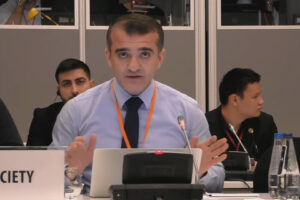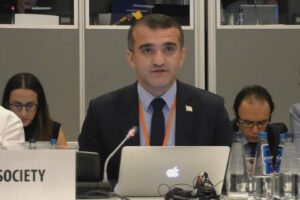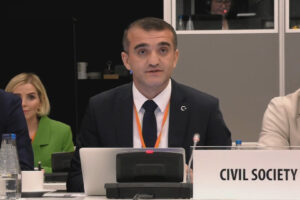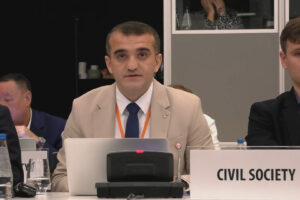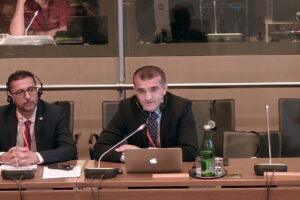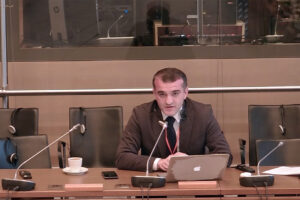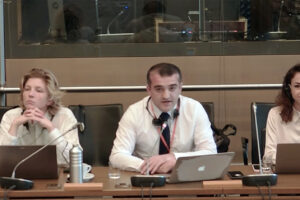Freedom House: Situation in the post Soviet are is worsening

 In a new report, Freedom House highlights Russia’s pivotal role in a decade-long decline in democracy among the countries of the post-Soviet sphere.
In a new report, Freedom House highlights Russia’s pivotal role in a decade-long decline in democracy among the countries of the post-Soviet sphere.
The report, Nations in Transit 2014, shows Russia as the model and inspiration for policies leading to a retreat from free institutions throughout Eurasia and bringing the region to a new, alarming level of repression during the past year.
“The events of 2013 show that the regime in Russia as a role model for other authoritarian leaders, even in states where the authorities already surpass their Russian counterparts in institutionalized brutality and intolerance,” said Sylvana Habdank-Ko?aczkowska., project director of the report. “Ten years ago, one in five people in Eurasia lived under Consolidated Authoritarian rule, as defined in the report. Today, it’s nearly four in five, and the trend is accelerating.”
Nations in Transit 2014 finds that setbacks to democratic governance as the dominant trend across Eurasia and the Balkans, as well as in post communist Central Europe, where the persistence of clientelism and corruption was in evidence throughout the past year. However, the year also brought some positive developments. Kosovo, Albania, and Georgia received better ratings due to improved elections and peaceful transfers of power. Key findings:
* Of the 29 countries assessed in 2013, 13 were rated as democracies, 6 as transitional regimes, and 10 as authoritarian regimes.
* As in every year for the past 10 years, the average democracy score declined in 2013, with 16 countries suffering downgrades, 5 improving, and 8 not registering any score change.
* Russia’s negative influence on the governance practices of its neighbors became more pronounced in 2013, as replicas of Russian laws restricting “homosexual propaganda” and foreign funding of NGOs appeared in several Eurasian countries.
* Corruption increased in Central and Eastern Europe in 2013, with half of the 10 assessed European Union (EU) member states receiving downgrades.
* The Balkans registered some positive developments during the year, including Croatia’s EU accession and a historic agreement between Kosovo and Serbia, but dysfunctional governments continued to drive down democracy scores in the region overall.
* The environment for civil society became more hostile in Russia, Azerbaijan, and Kazakhstan.
* Civil society proved resilient in Ukraine and Kyrgyzstan, both of which registered ratings improvements in that category.
* Kyrgyzstan and Georgia are the only Eurasian countries where ratings have consistently improved in the last five years.
* Conditions remained dire in Belarus, Turkmenistan, and Uzbekistan-the report’s worst performers.
Freedom House: Situation in the post Soviet are is worsening
 10 June 2014
10 June 2014
 In a new report, Freedom House highlights Russia’s pivotal role in a decade-long decline in democracy among the countries of the post-Soviet sphere.
In a new report, Freedom House highlights Russia’s pivotal role in a decade-long decline in democracy among the countries of the post-Soviet sphere.
The report, Nations in Transit 2014, shows Russia as the model and inspiration for policies leading to a retreat from free institutions throughout Eurasia and bringing the region to a new, alarming level of repression during the past year.
“The events of 2013 show that the regime in Russia as a role model for other authoritarian leaders, even in states where the authorities already surpass their Russian counterparts in institutionalized brutality and intolerance,” said Sylvana Habdank-Ko?aczkowska., project director of the report. “Ten years ago, one in five people in Eurasia lived under Consolidated Authoritarian rule, as defined in the report. Today, it’s nearly four in five, and the trend is accelerating.”
Nations in Transit 2014 finds that setbacks to democratic governance as the dominant trend across Eurasia and the Balkans, as well as in post communist Central Europe, where the persistence of clientelism and corruption was in evidence throughout the past year. However, the year also brought some positive developments. Kosovo, Albania, and Georgia received better ratings due to improved elections and peaceful transfers of power. Key findings:
* Of the 29 countries assessed in 2013, 13 were rated as democracies, 6 as transitional regimes, and 10 as authoritarian regimes.
* As in every year for the past 10 years, the average democracy score declined in 2013, with 16 countries suffering downgrades, 5 improving, and 8 not registering any score change.
* Russia’s negative influence on the governance practices of its neighbors became more pronounced in 2013, as replicas of Russian laws restricting “homosexual propaganda” and foreign funding of NGOs appeared in several Eurasian countries.
* Corruption increased in Central and Eastern Europe in 2013, with half of the 10 assessed European Union (EU) member states receiving downgrades.
* The Balkans registered some positive developments during the year, including Croatia’s EU accession and a historic agreement between Kosovo and Serbia, but dysfunctional governments continued to drive down democracy scores in the region overall.
* The environment for civil society became more hostile in Russia, Azerbaijan, and Kazakhstan.
* Civil society proved resilient in Ukraine and Kyrgyzstan, both of which registered ratings improvements in that category.
* Kyrgyzstan and Georgia are the only Eurasian countries where ratings have consistently improved in the last five years.
* Conditions remained dire in Belarus, Turkmenistan, and Uzbekistan-the report’s worst performers.
 @
@










